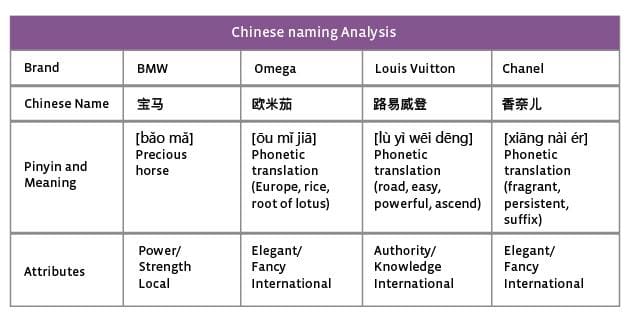

Read the updated version of this articleThe Six Laws of Chinese Brand Name here.
Nowadays it is widely recognized that a company looking to be successful in the global marketplace should seriously consider entering China. China, with its huge population and rapid development, represents a growing market for both domestic and foreign enterprises to explore. Even during a period of financial crisis, the Chinese market is still aggressively pushing onwards and upwards. At the same time, commercial success in China is not as easy as it might seem; great challenges are often met by foreign firms. A challenge that can be encountered during the initial stages is that of brand naming. One way to make a foreign brand more appealing for Chinese consumers is to develop an effective Chinese brand name.
Some companies argue that their original foreign corporate naming perfectly embody their brand identity, and as they want to communicate their foreignness to Chinese consumers, they do not want a Chinese name. Yet, this kind of thinking ignores cultural differences as well as the benefits that might be realized from adapting to local consumer preferences. Furthermore, a Chinese brand name can become the local embodiment of your brand’s culture, values, personality and vision, making it a consideration that should not be taken lightly.
Firstly, we must recognize it is always more comfortable for people to communicate in their mother tongue, and this rule obviously applies to Chinese consumers. If your company does not want to give their products a Chinese brand name, they may find there are other players in the marketplace that will rise to the occasion. For one, Chinese consumers are likely to make a simple translation of the brand name according to its English pronunciation. In this case, the name may not effectively communicate your brand attributes or attract your target market. Even worse, a competitor or counterfeiter could create a Chinese version of your name and make it their own—as has happened to Starbucks. Before the American coffee retailer had officially registered their Chinese brand name “星巴克[xīng bā kè]”, they found that a local café in Shanghai had already been using their Chinese name “上海星巴克[shànghǎixīngbākè]”. In addition, the local chain was posting a similar round, green logo with white letters and a black center! Needless to say, this was unfortunate for Starbucks as it served to confuse customers, with some perhaps even regarding “上海星巴克” [shànghǎixīngbākè] as a branch of the original Starbucks. Perhaps this unfortunate situation could have been avoided if Starbucks had registered their Chinese name earlier on.

Importance of registering a Chinese brand name: Starbucks and their counterfeiter
A Chinese brand name will also allow you to better protect your trademark. A trademark is a unique symbol which represents your company. If it is not well protected, your brand image can be harmed due to counterfeiters.
Let’s look at the case of the world-famous auto producer, Porsche. Porsche has registered their Chinese corporate name (保时捷 [bǎo shí jié]); however, they have not registered any product names, thus providing an opportunity for local businessmen to take advantage of Porsche’s popularity. Chinese names of Porsche models have now been registered by other companies and individuals as trademarks in China. For instance, 卡雷拉[kǎ léi lā], the Chinese name for Porsche Carrera, was registered in 2002 by an electrical bicycle factory in Zhejiang Taizhou. This will make it difficult, if not impossible, for Porsche to officially register Carrera’s Chinese name in the future even if they wanted to. In addition, as a luxury car company, Porsche would not want its brand to be even remotely associated with products such as electric bicycles, which it very well could be.
Besides the disadvantages of not possessing a Chinese brand name, we can also acknowledge the advantages of having one. Firstly, your Chinese name can be linguistically appealing and attract your target market. A good Chinese brand name can also help transfer the brand equity of your original brand into the Chinese market, at the same time adding a local dimension to your brand’s identity. For example, Chanel is one of the most recognized names in the luxury, fashion, and cosmetic goods industries. Its Chinese name “香奈儿 [xiāng nài ér]” is mainly a phonetic translation of the original brand, but it also evokes associations of elegance and international appeal. This is because 香[xiāng] means fragrant while 奈儿[nài ér] is purely a phonetic translation, thereby reminding the customers of the brand’s international origin. Chanel’s Chinese name is an effective combination of both local and international elements which can greatly appeal to its target market.
Some other positive examples can be cited to help us better understand the importance of a Chinese brand name. BMW, a luxury vehicle manufacturer, has the Chinese name 宝马 [bǎo mǎ], which means “precious horse”. This Chinese name not only stands for power and strength, but also sounds quite local since “宝马” is taken from an ancient Chinese poem. On the other hand, Omega (Chinese name欧米茄 [ōu mĭ jiā]) is an example of a phonetic translation (the Chinese characters means Europe, rice and root of lotus). This combination creates a sense of elegance, yet its international origin is also apparent. 路易威登[lùyìwēidēng] is a phonetic translation (meaning road, easy, powerful, ascend) of luxury brand Louis Vuitton. This Chinese name strongly implies authority and knowledge, and creates a link to its French origin and the spirit of travel.

Chinese naming Analysis

Foreign brands with successful Chinese brand names: BMW, OMEGA, Louis Vuitton, CHANEL
As the above examples illustrate, it is critical for many foreign companies to identify an inspired and carefully researched Chinese brand name. An ideal Chinese brand name should be able to successfully balance legal, linguistic, market and cultural elements. Such Chinese brand names will provide the foundation for your brand’s success in China and allow you to build brand equity in this unique marketplace.
DOWNLOAD REPORT
A Labbrand Group Company © 2005-2024 Labbrand All rights reserved
沪ICP备17001253号-3* Will be used in accordance with our Privacy Policy
To improve your experience, we use cookies to provide social media features, offer you content that targets your particular interests, and analyse the performance of our advertising campaigns. By clicking on “Accept” you consent to all cookies. You also have the option to click “Reject” to limit the use of certain types of cookies. Please be aware that rejecting cookies may affect your website browsing experience and limit the use of some personalised features.